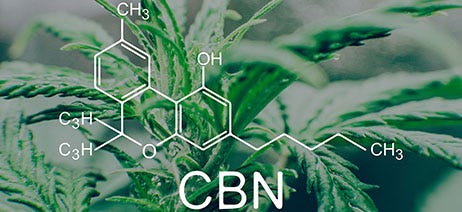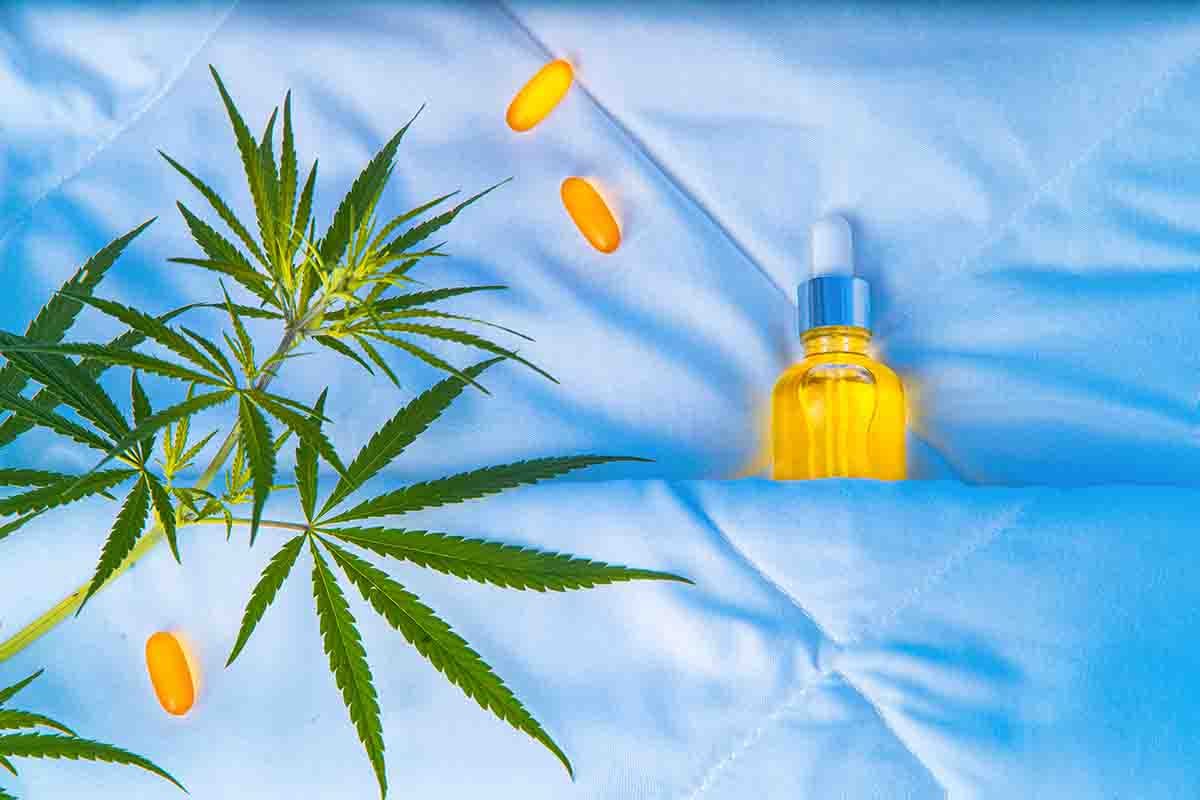
What Is CBN & How Is It Different From Other Cannabinoids?
You might have heard about CBD and THC, but what about CBN? Known as the “sleepy cannabinoid,” CBN is making waves in the cannabis world for its potential to help with relaxation and sleep. But what exactly is CBN, and how does it compare to other cannabinoids?
In this guide, we’ll break down everything you need to know about CBN, including:
- What Is CBN?
- Where Does CBN Come From?
- Is CBN Psychoactive?
- What Are the Potential Benefits of CBN?
- How Does CBN Work With Other Cannabinoids to Promote Sleep?
- FAQs about CBN
What is CBN?
CBN, or cannabinol, is a naturally occurring cannabinoid found in the cannabis plant. But unlike THC or CBD, it isn’t produced directly in the trichomes, the resin glands of the plant. Instead, CBN develops gradually as THC breaks down due to exposure to light, heat, and oxygen—a process known as natural decarboxylation. This transformation often occurs in older cannabis plants, making CBN more prominent in aged plant material.1


As the first cannabinoid to be isolated in 1896, CBN caught the attention of both researchers and cannabis users alike in the 1940s.2 Though CBN is only mildly psychoactive, with a fraction of the potency of THC, it has still piqued interest for its potential therapeutic effects, particularly as a sleep aid.3
While scientific studies on CBN are still in the early stages, its presence in aged cannabis has made it a topic of interest for both researchers and consumers. Combined with its gentle psychoactive properties, CBN offers unique possibilities for wellness, particularly in promoting relaxation and improving sleep quality.
Where Does CBN Come From?
CBN is actually a product of oxidative degradation. When Delta-9 THC is exposed to air and light over time, through a process of natural decarboxylation, it breaks down into CBN. This process means that older cannabis plants or improperly stored cannabis may have higher levels of CBN compared to fresher flower. Though CBN is a natural cannabinoid, it isn’t produced in the trichomes like other cannabinoids. Instead, the cannabinoid is a result of the plant’s aging process.4
Is CBN Psychoactive?
While CBN can produce mild psychoactive effects, it’s not nearly as potent as THC. Unlike THC, which binds strongly to the CB1 receptors in the brain, CBN binds much more weakly, making its psychoactive potential only about 25% as effective as THC. This means that even at higher doses, CBN tends to produce much milder effects, offering cannabis enthusiasts a slight sense of relaxation without the intense high commonly associated with THC.5
What Are the Potential Benefits of CBN?
CBN has a range of potential benefits, although research remains more limited compared to its more well-known counterparts, CBD and THC.6 However, the early findings show promise in several key areas:
- Sleep Aid: CBN is often highlighted for its mild sedative properties, which can make it an option for those seeking alternative ways to improve sleep quality. It's commonly recommended for individuals with insomnia or who have difficulty staying asleep, though more research is needed to confirm its overall effectiveness. Many users report that it helps them feel more relaxed, naturally easing them into sleep without the grogginess associated with other sleep aids.7


- Pain Relief & Anti-Inflammatory Properties: Similar to other cannabinoids, like CBD, CBN may offer pain-relieving and anti-inflammatory effects. This has made it an attractive option for those managing chronic pain, arthritis, or inflammatory conditions. While more research is necessary, the potential to alleviate pain without the high associated with THC has gained attention.8
- Antibacterial Properties: Some studies suggest that CBN may act as a potent antibacterial agent, making it a potential candidate for addressing certain bacterial infections. This includes bacteria that may be resistant to traditional antibiotics.9
More on CBN and Sleep
The relationship between CBN, CBD, THC, and other cannabinoids in promoting sleep is complex. Each cannabinoid interacts with the body’s endocannabinoid system in a unique way, affecting how we experience sleep and relaxation.
Even though CBN has been nicknamed the “sleepy cannabinoid,” CBD is often favored in research because of its abundance in cannabis plants and well-documented calming effects. Studies suggest that CBD may be more effective at reducing anxiety and stress, which can indirectly improve your sleep quality.


It’s also unclear whether CBN and other cannabinoids directly improve sleep or if they help ease the symptoms that keep you from getting a good night’s rest. Some of the symptoms and conditions that might hinder your sleep include anxiety, stress, post-traumatic stress disorder (PTSD), and chronic pain.9
Some experts also believe that the synergy between CBN and CBD, known as the entourage effect, can enhance the overall impact of these cannabinoids, potentially making them more effective together than when used individually. The entourage effect suggests that multiple cannabinoids and terpenes can amplify each other’s benefits, leading to a more balanced and comprehensive effect.10
In the context of sleep, CBN may offer mild sedative properties, while CBD could help reduce anxiety and promote a sense of calm, making it easier to drift into restful sleep. This combination could provide a more holistic approach to improving sleep quality, especially for those who find that CBN alone does not fully address their sleep challenges.


FAQs About CBN
Do you have more questions about CBN? Here are some common questions to help you get started, or ask your favorite budtender the next time you visit a dispensary.
Are there cannabis strains with more CBN?
Higher CBN levels are usually found in aged cannabis or strains that have been exposed to light and air over time. But some cannabis strains with high CBN concentrations include Bubble Gum, Durban Poison, Banana OG, Mr. Nice, Animal Cookie, Purple Cadillac, and Death Bubba.13
Is CBN synthetic?
No, CBN is a naturally occurring cannabinoid that forms when THC degrades because of age or environmental conditions.
Where can I buy CBN products?
You can purchase CBN products from a state-licensed dispensary like Verilife. Products from these dispensaries are thoroughly tested to meet state regulations and ensure that they contain the ingredients listed on the label, providing peace of mind with every purchase. By choosing a licensed dispensary, you know you’re getting high-quality products that are safe and effective.
Will CBN get me high?
In large doses, CBN might produce a mild psychoactive effect because it’s a degraded form of THC. However, the effects of this cannabinoid are much milder compared to the potent high that THC can produce. This makes CBN an excellent choice for those who want to unwind without the intense psychoactivity of THC. Most users report that CBN offers relaxation without intense psychoactivity.
How sedating is CBN?
The sedative effects of CBN can vary depending on the individual’s endocannabinoid system. Factors like metabolism, body weight, and overall cannabinoid tolerance can influence how CBN affects you. While some may find CBN to be relaxing, others might not experience the same level of drowsiness. Always start with a low dose to see how your body responds.


Cannabis Products with CBN
If you are interested in exploring CBN benefits, many cannabis products are now formulated to include this lesser-known cannabinoid. These products range from tinctures to edibles, and there are CBN-rich cannabinoid blends that may offer a balanced experience of relaxation and therapeutic potential. If you are keen to learn more about CBN, chat with your favorite Verilife budtender the next time you visit one of our licensed cannabis dispensaries.
Sources:
1. “CBN (cannabinol),” Leafly, https://www.leafly.com/learn/cannabis-glossary/cannabinol-cbn
2. “Minor Cannabinoids: Biosynthesis, Molecular Pharmacology and Potential Therapeutic Uses,” Frontiers, November 29, 2021, https://www.frontiersin.org/journals/pharmacology/articles/10.3389/fphar.2021.777804/full
3. “Cannabinoid pharmacology: the first 66 years,” National Library of Medicine, January 2006, https://www.ncbi.nlm.nih.gov/pmc/articles/PMC1760722/
4. “Cannabinol: History, Syntheses, and Biological Profile of the Greatest “Minor” Cannabinoid,” National Library of Medicine, November 2022, https://www.ncbi.nlm.nih.gov/pmc/articles/PMC9658060/
5. “Cannabinol,” ScienceDirect, https://www.sciencedirect.com/topics/chemistry/cannabinol
6. “CBD vs. CBN: Benefits and Differences,” Healthline, January 14, 2021, https://www.healthline.com/health/cbd-vs-cbn#cbn-benefits-uses
7. “How CBN Can Improve Your Sleep, Mood, and Health,” Psychology Today, March 21, 2019, https://www.psychologytoday.com/us/blog/sleep-newzzz/201903/how-cbn-can-improve-your-sleep-mood-and-health
8. “Review: Minor Cannabinoids Acknowledged to Possess Therapeutic Properties,” NORML, January 6, 2022, https://norml.org/news/2022/01/06/review-minor-cannabinoids-acknowledged-to-possess-therapeutic-properties/
9. “CBN for Sleep,” Sleep Foundation, November 8, 2023, https://www.sleepfoundation.org/sleep-aids/cbn-for-sleep#:~:text=The%20limited%20scientific%20evidence%20in,took%20CBN%20together%20with%20THC
10. “Can CBN Help You Sleep Better?” GoodRx, April 16, 2024, https://www.goodrx.com/well-being/sleep/cbd-for-sleep#how-cbd-works
11. “What Is CBN? Guide to the Cannabinoid,” Leafwell, https://leafwell.com/blog/cannabinol-cbn-cannabinoid


